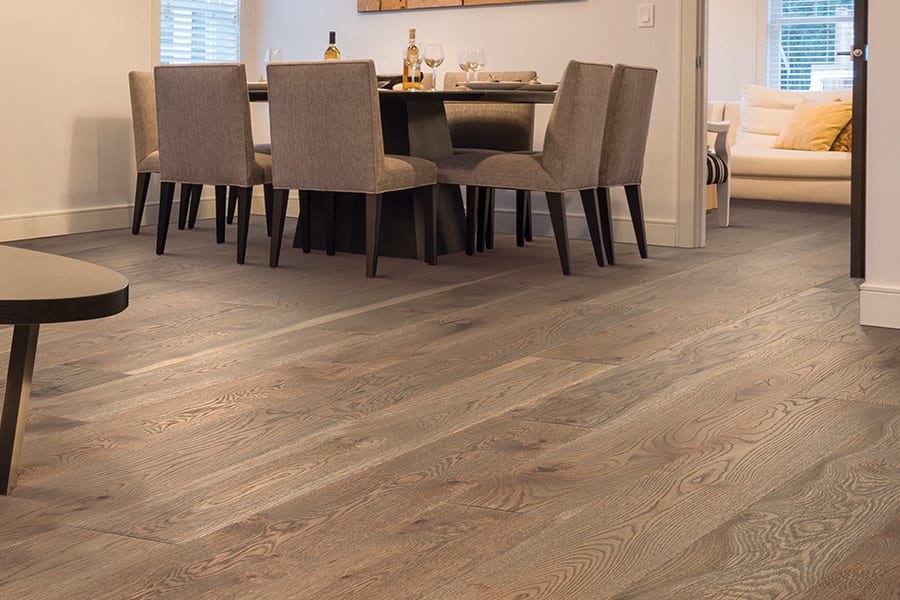Hardwood flooring could be your best choice
If you've never experienced hardwood flooring, you might not know what you're missing. The materials offer stunning and timeless visuals along with outstanding durability. But they also provide one of the most extended lifespans in the industry.
Once you compare your requirements to the benefits you find here, you'll find an excellent match. And with outstanding choices that you can customize, you'll get everything you need. But, of course, the more you know about your options, the better choices you can make.
Once you compare your requirements to the benefits you find here, you'll find an excellent match. And with outstanding choices that you can customize, you'll get everything you need. But, of course, the more you know about your options, the better choices you can make.
The visual appeal is impressive
It's easy to get the look you want when you there’s so many options of wood floors to choose from. It starts with choosing a perfect wood species that can meet your needs. Species such as Hickory, Oak, and Walnut offer character and a dense durable surface. While species like Maple, Fir, and Birch offer a softer, lighter and cleaner look.
On top of different wood species, there are a variety of different finishes and stains, from oil to lacquer, from matte to smooth, you can be sure that you can find a color and feel that your feet and eyes will love.
The result is a beautiful surface that will match any decor you currently have. But don't forget to check in with all the latest and hottest trends.
Solid hardwood
Solid hardwood is milled from a real hardwood species, making it the sole material used in the making of this type of flooring. Solid hardwood is noted for adding overall structural strength to the building in which it is installed. The degree to which this is true depends upon the species of wood. Solid Hardwood also tends to have a few wood knots and grains which give it a natural look and gives your home natural beauty.
Engineered Hardwood
Engineered hardwood is manufactured from three or more layers of high density fiberboard (HDF) or medium density fibreboard (MDF), and a real hardwood veneer top layer bonded together under heat and pressure. It is more suitable in highmoisture areas or in areas with frequent temperature changes than solid hardwood due to its "multipleply plank" construction. Engineered hardwood is constructed to be more dimensionally stable through multiply design. This allows greater resistance to temperature changes. Engineered hardwood does not warp or cup during climatic changes. It also is more resistant to higher moisture levels than solid flooring. It is a better choice for installation over radiant heat sources, damp basements, and locations in rainy climates.
On top of different wood species, there are a variety of different finishes and stains, from oil to lacquer, from matte to smooth, you can be sure that you can find a color and feel that your feet and eyes will love.
The result is a beautiful surface that will match any decor you currently have. But don't forget to check in with all the latest and hottest trends.
Types of hardwood
Solid hardwood
Solid hardwood is milled from a real hardwood species, making it the sole material used in the making of this type of flooring. Solid hardwood is noted for adding overall structural strength to the building in which it is installed. The degree to which this is true depends upon the species of wood. Solid Hardwood also tends to have a few wood knots and grains which give it a natural look and gives your home natural beauty.
Engineered Hardwood
Engineered hardwood is manufactured from three or more layers of high density fiberboard (HDF) or medium density fibreboard (MDF), and a real hardwood veneer top layer bonded together under heat and pressure. It is more suitable in highmoisture areas or in areas with frequent temperature changes than solid hardwood due to its "multipleply plank" construction. Engineered hardwood is constructed to be more dimensionally stable through multiply design. This allows greater resistance to temperature changes. Engineered hardwood does not warp or cup during climatic changes. It also is more resistant to higher moisture levels than solid flooring. It is a better choice for installation over radiant heat sources, damp basements, and locations in rainy climates.
Request a design consultation
Hardwood flooring requires acclimation
The most important part of the installation process is the acclimation service. Both solid and engineered wood flooring must go through acclimation before installing them. And the process can take from one to three days, depending on the humidity and the weather.
After acclimation, installation can proceed as usual. Once you choose your hardwood flooring, you'll learn about every installation detail. And if you have questions, we have the answers you need.
After acclimation, installation can proceed as usual. Once you choose your hardwood flooring, you'll learn about every installation detail. And if you have questions, we have the answers you need.
Visit us for your hardwood flooring and more
At Metro Floors Inc, we offer everything you need for the perfect hardwood flooring experience. Our associates are always standing by to ensure your results are as successful as possible. And we'll work with you from start to finish for any size remodel.
If you visit our Portland, OR showroom, you'll find the hardwood flooring you'll love for years to come. From there, we serve Portland, OR and Vancouver, WA, and we look forward to working with you too. So, stop by today to get your project underway.
If you visit our Portland, OR showroom, you'll find the hardwood flooring you'll love for years to come. From there, we serve Portland, OR and Vancouver, WA, and we look forward to working with you too. So, stop by today to get your project underway.













